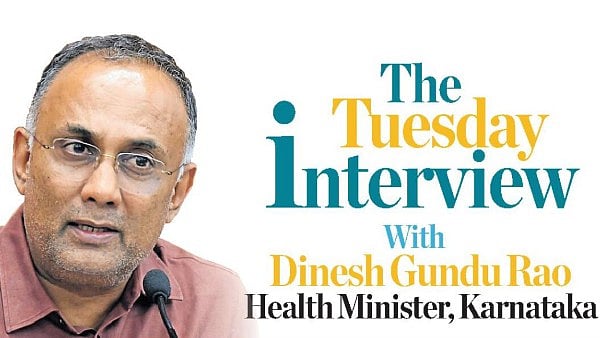
Karnataka’s Health Minister Dinesh Gundu Rao
Credit: Special Arrangement
Over the past year, the state health department has tackled major disease outbreaks and scares, launched several initiatives, and promised corrective action or stringent measures when things didn’t go as planned. This year, the department’s focus areas include strengthening maternal care, ensuring transparency in drug procurement and testing, setting up a dedicated helpline, and upgrading taluk hospitals, according to Karnataka’s Health Minister Dinesh Gundu Rao, who spoke with DH’s Udbhavi Balakrishna. Excerpts:
You announced strong measures to tackle maternal deaths after your department drew a lot of flak for deaths reported last year. What is the budget allocated and timeline for implementing these measures?
The maternal death rate in Karnataka has been declining. We will launch a mission with a Rs 96 crore allocation to bring preventable maternal deaths to zero shortly. We are trying to identify gaps, the reasons for maternal deaths, and whether they could have been prevented. Our approach is multi-pronged, and the timeline is immediate. Regular, detailed maternal death audits will continue, and we’ll increase visits from auxiliary nurse midwives (ANMs) and doctors to pregnant women. We’ll also assess whether these women fall into high-risk categories early on. Additionally, we’re ensuring every taluk hospital operates 24/7, with two gynaecologists, obstetricians, and pediatricians each. We’ll achieve this through contract hiring and reorganising existing staff.
What are you doing to streamline drug procurement and testing processes?
We’ve taken a significant step by merging the drug control and food safety departments into a single authority, headed by a commissioner. To bring in fresh perspectives and enhance transparency, we’ve appointed someone from outside the drug control department to lead this new entity. We will focus on improving our drug testing labs and ensuring that all test results are uploaded to the department’s portal for public access. We’ve also appointed a new managing director for the Karnataka State Medical Supplies Corporation Limited (KSMSCL) to strengthen our drug procurement processes. KSMSCL will be completely overhauled. Tamil Nadu has the best procurement system in the country; we are bringing something similar here and making the process more competitive. We are calling tenders now for supply to begin from April.
What has been done since the Justice Cunha commission’s interim report?
Two Cabinet subcommittee meetings were held with the deputy chief minister as chairman, and the report was discussed in detail. A unit has been established to oversee the implementation of the inquiry commission’s recommendations. KSMSCL’s MD has issued notices to recover approximately Rs 170 crore from 274 suppliers of medicines and other materials related to Covid-19 management. FIRs have been filed against the then director of the medical education department, the financial assistant, and the health equipment officer over irregularities in PPE kit purchases. Additionally, notices have been issued to 35 suppliers to recover around Rs 35 crore related to Covid testing misconduct. The health department is also investigating allegations of misconduct in purchasing PPE kits and liquid oxygen.
Many of the demands put forth by the ASHAs remain unfulfilled...
Karnataka is among the top five states in terms of remuneration given to ASHAs. We have agreed to give them Rs 10,000 per month, effective from April 1. We will work to improve the RCH portal, as the ASHAs said they faced challenges using it. We have also agreed to give ASHAs who have worked for over five years a 15-day paid leave per year, with an option to accumulate it year on year too.
What measures are being taken to prevent infectious disease outbreaks, especially dengue, this year?
We’ll convene a meeting with the urban and rural development departments by mid-to-late February, well ahead of the monsoon season, to discuss surveillance strategies for vector-borne diseases like malaria, dengue, and chikungunya. Our teams will conduct surveys, collect serum samples from primary and community health centres in cases of fever, and put our existing plan on alert mode.
What is the status of the projects announced in last year’s budget?
Tenders for critical care blocks in Udupi and Davanagere will be allocated soon, and grounding will begin in the next few months. In Vijayapura, we are upgrading an existing unused structure as a critical care block and providing necessary equipment. Tenders have been called for converting many PHCs to CHCs. Additionally, we will soon formally launch the daycare chemotherapy centers that will operate in a hub-and-spoke model in each district hospital, which will set aside 10 beds for chemotherapy patients. We will provide the drugs. Kidwai and a few private cancer hospitals have tied up with us as hubs.
What projects do you plan to include in this year’s budget?
We are not looking at any new big projects currently; we want to focus on implementing existing programmes and improving systems. Taluk hospitals need additional strengthening; we want to ensure that they reach high standards in infrastructure, human resources, and services offered. We are expanding Gruha Arogya and the Puneeth Rajkumar Hrudaya Jyoti STEMI scheme this year. We also want to introduce a state-of-the-art ambulance service and establish the helpline that was discontinued years ago.